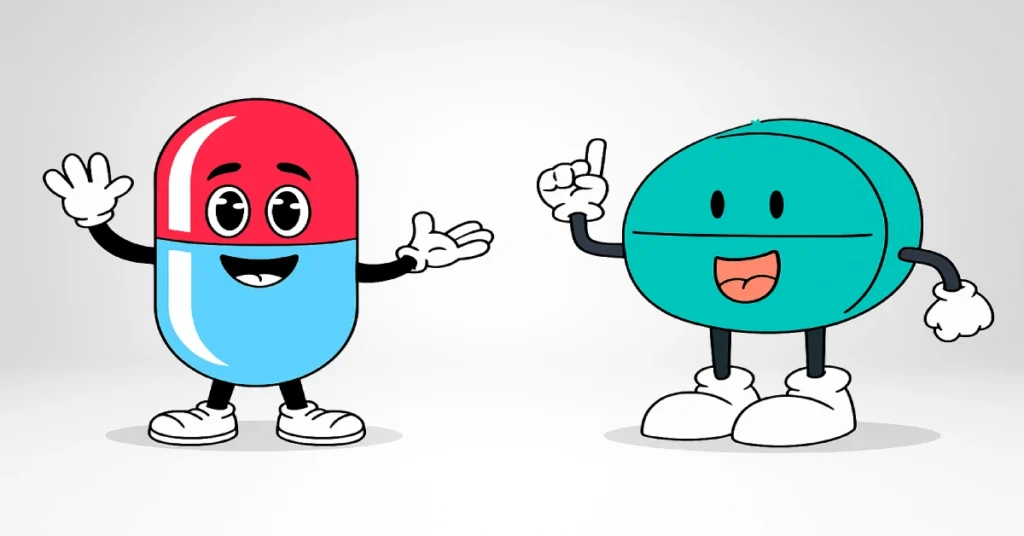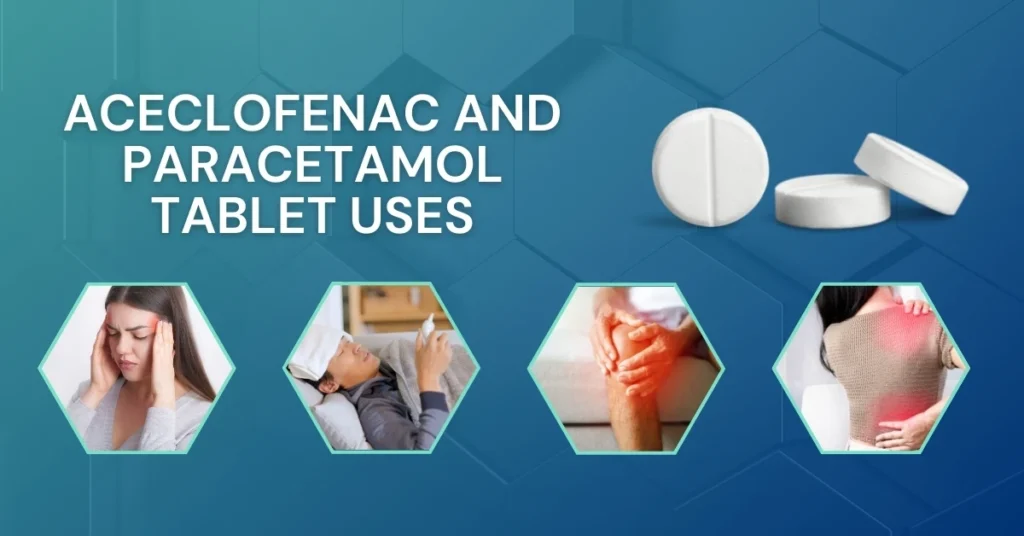Most people take medicines in the form of tablets or capsules every day, but have you ever thought about what makes them different? A tablet is a small, solid piece that contains medicine in compressed form. On the other hand, a capsule is a tiny container, usually made of a soft or hard shell, filled with medicine in powder, liquid, or gel form.
In simple words, the capsule definition is a medicine packed inside an outer shell, while a tablet is a pressed powder. When it comes to capsule vs tablet, both are effective, but their design, absorption, and usage have unique differences. Understanding these differences can help you know which form suits your needs better and why manufacturers choose one over the other.
What is a Tablet?
A tablet is one of the most common forms of medicine people use worldwide. Simply put, the tablet meaning is a solid dose of medicine that is made by compressing powdered ingredients into a small, firm shape. This shape can be round, oval, or even square, depending on how it is made.
How Tablets Are Made
Tablets are created using machines that press the powdered medicine together with other helpful substances called binders. These binders hold the medicine together firmly so it does not break apart easily. Sometimes, tablets also have a special outer coating to make them easier to swallow or to protect the medicine from moisture and air.
Types of Tablets
Here are some types of tablets commonly used
- Standard Tablets: Simple compressed medicines taken with water.
- Chewable Tablets: Soft enough to chew without water, often used for vitamins.
- Effervescent Tablets: Dissolve quickly in water, releasing the medicine in a fizzy drink.
- Sublingual Tablets: Placed under the tongue to absorb quickly into the body.
- Film-Coated Tablets: Have a thin coating to make swallowing easy and mask any bad taste.
Advantages of Tablets
Using tablets comes with many benefits:
- Cost-effective: Tablets are cheaper to manufacture compared to capsules.
- Long shelf life: They can stay usable for a longer time if stored properly.
- Different release types: Some tablets release medicine slowly over time, giving longer relief.
- Easy packaging: They are easy to store and carry in strips or bottles.
Disadvantages of Tablets
Despite their benefits, tablets also have some drawbacks:
- Bitter taste: Some tablets taste bad if they don’t have a coating.
- Slow absorption: They may take longer to dissolve and work in the body compared to capsules.
- Hard to swallow: Larger tablets can be difficult for some people to take, especially children and older adults.
What is a Capsule?
A capsule is another popular way to take medicines, often used when the medicine needs to be protected until it reaches the stomach. The capsule meaning in simple words is a small container that holds the medicine inside. In pharmacy, the capsule definition is a dosage form where the drug is enclosed within a shell.
How Capsules Are Made
Capsules are made using an outer shell and filling. The outer shell is usually made from gelatin or plant-based materials. The inside part contains the medicine, which can be in powder, liquid, or even gel form. The shell keeps the medicine safe and helps it reach the stomach or intestine without getting damaged by air or moisture.
Types of Capsules
Here are the types of capsules used in medicines:
- Hard Gelatin Capsules: These are two-piece capsules filled with dry powdered medicines or tiny pellets.
- Soft Gelatin Capsules: These are single-piece capsules that contain liquids, oils, or semi-solid medicines. They are smooth and easy to swallow.
Advantages of Capsules
Capsules have several benefits:
- Easy to swallow: Their smooth shell makes them easier to take than tablets.
- No bad taste: The shell covers the taste of the medicine completely.
- Faster absorption: Capsules dissolve quickly, helping the medicine work sooner.
- Better for oils and liquids: Medicines that are in liquid or oily form can be packed in soft capsules easily.
Disadvantages of Capsules
However, capsules also have some limitations:
- Higher cost: They are more expensive to produce than tablets.
- Less stable: Capsules may not last as long as tablets because their shells can absorb moisture.
- Not suitable for all drugs: Some medicines cannot be packed into capsules if they react with the shell material.
Tablet vs Capsule: Key Differences
Here is a clear comparison to understand tablet vs capsule, including how each works in the body and their main features:
| Feature | Tablets | Capsules |
|---|---|---|
| Form | Solid compressed form made by pressing medicine powder into shape | Medicine enclosed within a soft or hard shell |
| Absorption | Slow & steady absorption as the tablet breaks down gradually | Faster absorption because the shell dissolves quickly, releasing the medicine sooner (capsule vs tablet absorption) |
| Taste masking | Less effective at covering bitter tastes | Very effective as the outer shell completely hides the taste (capsule vs pill) |
| Cost | Cheaper to manufacture, making them widely used | Slightly higher cost due to shell materials and filling process |
| Manufacturing | Simpler process involving compression machines | Needs capsule filling machinery and special shell materials |
Which is Better – Tablet or Capsule?
Both tablets and capsules have their own strengths, and choosing between them depends on the purpose of the medicine and user comfort.
Advantages of Tablets and Capsules
Tablets are known for being affordable, easy to store, and available in many forms like chewable or slow-release. They last longer on shelves and are cost-effective for manufacturers and patients.
Capsules, on the other hand, are easier to swallow due to their smooth shell. They hide any bitter taste of the medicine and work faster because the shell dissolves quickly to release the medicine inside.
Capsule vs Tablet Absorption
When it comes to capsule vs tablet absorption, capsules generally absorb faster in the body. This is because their shell breaks down quickly, making the medicine available for use sooner than tablets, which take time to dissolve.
Which is Better for Patients?
There is no single answer to which is better for all patients. Some people prefer capsules for their ease of swallowing and quick action, while others choose tablets for their lower cost and longer shelf life. The choice often depends on the medicine type, patient’s age, health condition, and personal comfort with swallowing different forms.
How Rosette Pharma Supports Your Tablet & Capsule Needs
At Rosette Pharma, we understand that choosing the right manufacturer for tablets and capsules is important for your business growth. That is why we focus on delivering quality, trust, and complete support.
Large Product Portfolio
Rosette Pharma offers a wide range of products in tablet and capsule forms. Whether you need common daily-use medicines or specialised formulations, we have a strong product portfolio to meet different market needs.
Franchise and Third Party Manufacturing Support
We provide full support for those looking to start their own business with us. Our PCD pharma franchise model is designed for growth with complete marketing and operational guidance. We also offer third party manufacturing services, giving you the option to launch your brand with our high-quality products, fast delivery, and dedicated assistance.
Looking to launch your own range of quality tablets and capsules? Contact us today for pharma franchise or third-party manufacturing support. Our team at Rosette Pharma is ready to help you grow your business with trusted products and complete guidance every step of the way.
What is the difference between tablet and capsule?
A tablet is compressed powder in solid form, while a capsule has medicine inside a soft or hard shell.
Is capsule better than tablet?
Capsules are easier to swallow and act faster, but tablets are cheaper and last longer.
Which absorbs faster, tablet or capsule?
Capsules absorb faster because their shell dissolves quickly in the stomach.
Why are capsules used instead of tablets?
Capsules hide bad taste, are easier to swallow, and suit liquid or oily medicines.
Are capsules easier to swallow than tablets?
Yes, their smooth shell makes them easier to swallow than tablets.
What is a caplet vs tablet vs capsule?
A caplet is a capsule-shaped tablet; tablets are solid compressed forms, and capsules have medicine in a shell.
What are types of tablets and capsules?
Types of tablets include chewable and effervescent; capsules are hard gelatin or soft gelatin forms.



